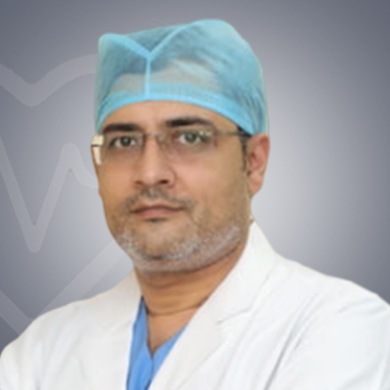
15 Years of experience
Speaks: English
Here is the list of some of the conditions Dr Satyam Taneja treats:
The goal of breast cancer surgery is to excise the tumor and a portion of the surrounding tissues while conserving the breast. Breast cancer surgery methods may vary in the amount of breast tissue which is removed with the tumor. This depends on the overall tumor location, how far it has spread, as well as one’s personal feelings. The surgeons also remove some lymph nodes under this arm so that these can be removed. This helps your doctor to plan your treatment.
There are around 200 different types of cancer and all these can cause different symptoms. The symptoms are often linked to some cancer types. The signs could also be general, including weight loss, fatigue, and unexplained pain. Some of the signs and symptoms of different types of cancer are as follows:
Dr Satyam Taneja works from 11 am to 6 pm on all days of the week, except Sunday.
Dr Satyam Taneja performs a wide variety of procedures for cancer treatment. Some of these are
The surgical oncologist can perform even the most complicated cases with ease. The doctor has reported a high success rate in performing various procedures with high precision and accuracy. The doctor also holds a rich experience in handling complex cases with ease. The specialist is proficient in using the latest techniques to perform the procedures. A surgical oncologist performs cancer surgery in two ways: minimally invasive surgery and open surgery. Minimally invasive surgery uses techniques that focus on minimizing the trauma of traditional surgery. Some of the minimally invasive techniques are cryosurgery, robotic surgery, laparoscopy, cryosurgery, and laser surgery. In open surgery, surgeons make a single large cut to remove the tumor and some healthy tissues.

Share Your Experience about Dr. Satyam Taneja

A surgical oncologist is a doctor who removes the tumor and adjacent tissues through surgery. They also perform some types of biopsies to diagnose cancer. A surgical oncologist performs surgeries to know which parts of the body cancer has spread. In order to diagnose cancer, a surgical oncologist might perform biopsies. After a biopsy, a surgical oncologist sends the samples to a pathologist. If cancer is detected, you may need to consult the surgical oncologist again to have the tumor removed. The surgical oncologist performs a staging surgery to determine a tumor’s size.
The tests required before and during the consultation by a surgical oncologist include:
A biopsy is a procedure in which a piece of tissue from your body is removed to analyze it in a laboratory. It is an effective way to diagnose cancer.
Your primary doctor will refer you to a surgical oncologist when he finds your symptoms similar to that of cancer. The surgical oncologist will tell you to get some tests done to diagnose cancer. If cancer is diagnosed, the doctor will design your treatment plan which will include some surgical procedures. Consider seeking assistance from a surgical oncologist in the below-listed situations: